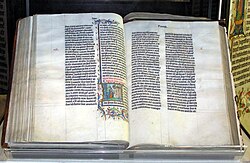
Back مسيحية تقدمية Arabic Progressiivinen kristillisyys Finnish Kristen progresif ID 진보 기독교 Korean Прогрессивное христианство Russian Progressiv kristendom Swedish Прогресивне християнство Ukrainian

Progressive Christianity represents a range of related perspectives in contemporary Christian theology and practice. It is a postmodern theological approach, which developed out of the liberal Christianity of the modern era.[1] Integrating and moving beyond the Enlightenment concerns of liberalism, Progressive Christianity is a postliberal theological movement that, in the words of Reverend Roger Wolsey, "seeks to reform the faith via the insights of post-modernism and a reclaiming of the truth beyond the verifiable historicity and factuality of the passages in the Bible by affirming the truths within the stories that may not have actually happened."[1]
Progressive Christianity, as described by its adherents, is characterized by a willingness to question tradition, acceptance of human diversity, a strong emphasis on social justice and care for the poor and the oppressed, and environmental stewardship of the earth. Progressive Christians have a deep belief in the centrality of the instruction to "love one another" (John 15:17) within the teachings of Jesus Christ.[2] It is largely a western, Anglosphere movement, with ecumenical and cross-denominational currents and influences. It is particularly influential in mainline Protestantism, with some influence among liberal and Post-Vatican II Roman Catholicism (especially those influenced by movements such as liberation theology), and American evangelicalism, particularly the emerging Church and exvangelical movements, and the evangelical left.
| Part of a series on the |
| History of Christian theology |
|---|
 |
|
|
- ^ a b Wolsey, Roger (10 February 2012). "Progressive Christianity Isn't Progressive Politics". The Huffington Post. Retrieved 16 January 2023.
- ^ "Soul Play: What Is Progressive Christianity Exactly?". The Flip Side. University of Wisconsin – Eau Claire. Retrieved 23 December 2012.[dead link]
© MMXXIII Rich X Search. We shall prevail. All rights reserved. Rich X Search